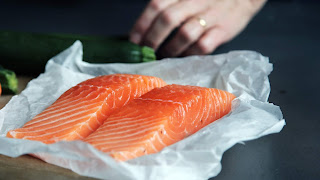Nutrition Basics 2: Omega-3 Fatty Acids
By now, I think most people have heard at least something about Omega-3s, which are a type of fat. But I'm going to delve a little deeper...
Omega-3s are a type of unsaturated fat, the "good" fat.
You may have also heard of Omega-6s or Omega-9s. They are also unsaturated fats.
You may have also heard of Omega-6s or Omega-9s. They are also unsaturated fats.
If you want to get into science, Omega-3s have a double bond between two carbon atoms at the omega-3 position (which means that the third carbon from the end of the fat chain not attached to a glycerol backbone).
When talking about Omega-3s, you may have heard of specific fats, like alpha-linolenic acid (ALA), Eicosapentaenoic Acid (EPA), and Docosahexanoic Acid (DHA)
These are different molecules, but they are grouped together because they all have a double bond in the omega-3 position. However, they are not the same.
As I mentioned in my Macronutrients post, there are two essential fats: alpha-linolenic acid (ALA) and linoleic acid. Alpha-linolenic acid (ALA) is an Omega-3 fat and linoleic acid is an Omega-6.
They are called essential fats because they are the only 2 fats that your body cannot make but that it needs to eat.
EPA & DHA often get a lot of talk in the media, but they are not considered essential. Your body may be able to make EPA and DHA from ALA, if your body has enough ALA.
Most people have heard fish is a good source of Omega-3s,but there are plenty of vegan sources. In fact, vegan sources are more likely to contain essential ALA, whereas fish contain more EPA and DHA.
For example, ¾ cup of cooked black-eyed peas contains 0.11 g ALA. 3 ounces of tilapia contains just 0.04 g ALA. The peas contain no EPA or DHA, but the tilapia contains 0.12 g DHA.
 |
| Photo by Jasmine Waheed |
Other vegan sources of Omega-3s include soy (tofu, soymilk, edamame), beans, almonds, chia seeds, flax seeds, pumpkin seeds, pecans, walnuts, canola oil, wheat germ, and winter squash.
Vegans can get DHA omega-3 from seaweed and algae. Try this seaweed salad from PBS.
If you’re vegetarian, eggs contain small amounts of DHA Omega-3s. Some brands sell eggs with higher levels of Omega-3s depending on what they feed the chickens. Some milk companies also offer DHA-fortified milk products.
Vegans can get DHA omega-3 from seaweed and algae. Try this seaweed salad from PBS.
If you’re vegetarian, eggs contain small amounts of DHA Omega-3s. Some brands sell eggs with higher levels of Omega-3s depending on what they feed the chickens. Some milk companies also offer DHA-fortified milk products.
It's relatively safe to take an omega-3 supplement. The most common side effect is burping up a fishy taste (for a fish oil supplement). Another potential side effect is diarrhea, but it was seen in <7% of people studied.
That said, it's always good to talk to a healthcare professional who knows you and your situation before starting any new supplements.
 |
| Photo by Gesina Kunkel. |
Potential Benefits of Omega-3s
There is a lot of research on the use of Omega-3s to prevent or treat diseases, such as asthma, heart disease, and depression. However, the National Institute of Health says the results are still "not completely clear."
For example, this article looked at multiple studies on treating depression with Omega-3 supplements. One study found patients felt better after 4 months of 10 grams of EPA and DHA a day. Another study found only 2 grams per day was enough, but a third study found 2 grams didn't work.
Again, you should discuss supplementation with your doctor. Your doctor can help you discuss the pros and cons. Some people may be advised to avoid extra fat, including Omega-3s, if they have digestive or gastrointestinal disorders.
 |
| Photo by Ali Yahya |
Readers, what's your favorite Omega-3-containing food?
As an Amazon Associate, I earn from qualifying purchases.


